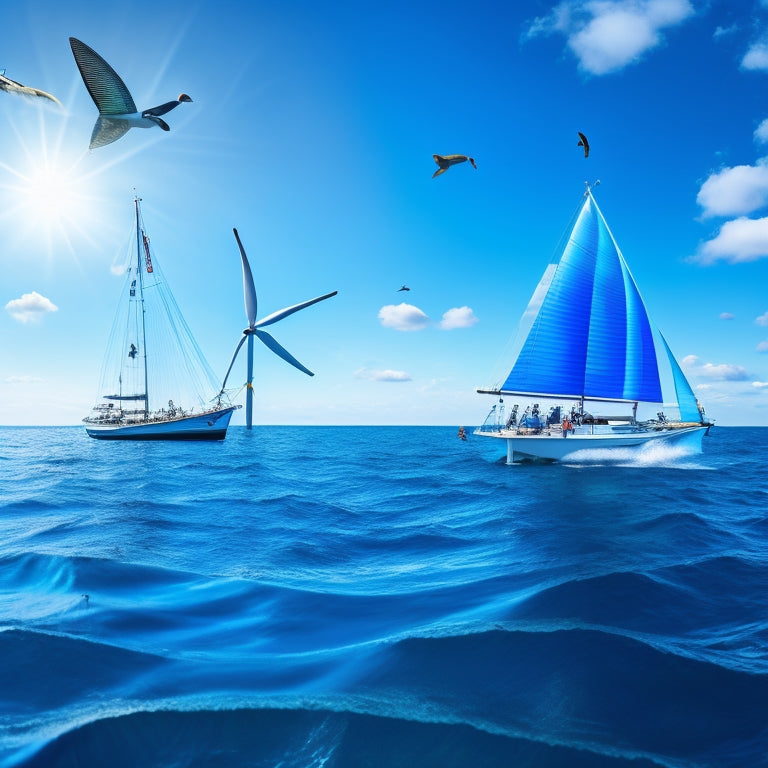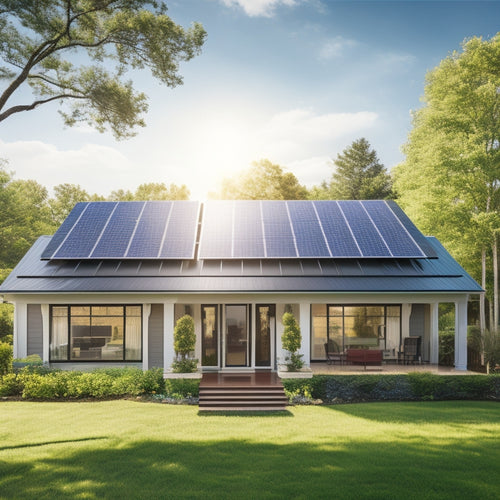
10 Essential Tips for Eco-Friendly Boat Energy Systems
Share
You're likely unaware that a typical boat's energy system can be a significant contributor to environmental pollution, but by implementing eco-friendly solutions, you can reduce your carbon footprint and create a more sustainable boating experience. To get started, assess your boat's energy needs by calculating power requirements and conducting an energy audit. Choose solar panels with high efficiency ratings, and opt for energy-efficient appliances like LED lighting and low-power kitchen essentials. Select a compatible battery bank and reliable inverter, and monitor your energy consumption with tracking devices. There's more to explore - continue to optimize your eco-friendly boat energy system.
Key Takeaways
• Conduct an energy audit to understand energy needs and identify areas of inefficiency in your boat's energy system.
• Select solar panels with high efficiency ratings and durable construction to withstand the marine environment.
• Choose energy-efficient appliances and lighting, such as LEDs, to reduce energy consumption and lower your carbon footprint.
• Implement a battery maintenance routine to extend the lifespan of your deep cycle batteries and ensure optimal performance.
• Regularly monitor energy consumption and adjust habits to reduce energy demands and optimize system performance.
Assess Your Boat's Energy Needs
Before designing an eco-friendly boat energy system, determine your boat's total energy load by calculating the power requirements of all onboard systems and appliances. This essential step will help you identify areas of inefficiency and optimize your energy usage.
Conducting an energy audit will give you a clear understanding of your vessel's energy needs, allowing you to make informed decisions about your energy system design.
Create a detailed vessel profile, outlining the specifications of your boat, including its size, type, and onboard systems. This profile will serve as a reference point for your energy audit, helping you to identify areas of high energy consumption. By analyzing your vessel's energy usage patterns, you can pinpoint opportunities for improvement and prioritize energy-saving measures.
A thorough energy audit will provide valuable insights into your boat's energy needs, enabling you to design an eco-friendly energy system that meets your unique requirements. By understanding your boat's energy profile, you can make informed decisions about energy-efficient upgrades, reducing your environmental impact while ensuring a reliable and sustainable energy supply.
Choose the Right Solar Panels
When selecting solar panels for your eco-friendly boat energy system, you'll need to take into account several key factors to make sure you're getting the most out of your investment.
You'll want to assess the panel's efficiency, considering the amount of energy it can produce per hour of sunlight.
Assessing Panel Efficiency
You need to take into account several key factors to make sure you're getting the most efficient solar panels for your boat's energy system. Evaluating panel efficiency is important to maximize your energy output and reduce your carbon footprint.
Here are some essential considerations to keep in mind:
-
Panel Durability: Look for panels with a durable design and high-quality materials to make sure they can withstand harsh marine conditions.
-
Heat Resistance: Choose panels with a high temperature coefficient to minimize energy loss in hot climates or during intense sunlight.
-
Efficiency Ratings: Opt for panels with high efficiency ratings (>20%) to generate more power per hour of sunlight.
- Warranty and Certifications: Verify that your panels come with a thorough warranty and relevant certifications (e.g., IEC 61215) to guarantee performance and quality.
Selecting the Right Size
With your solar panel efficiency factors in check, it's time to determine the right size of your solar panel array, as an undersized system won't meet your energy needs, while an oversized one will be a costly waste. To get it just right, you'll need to take into account your boat's unique energy profile. This includes your daily energy consumption, battery capacity, and charging requirements. Take stock of your boat's layout, too, as this will impact the available space for solar panels.
You'll want to calculate your total energy needs by adding up the power requirements of all your onboard systems, including lights, refrigeration, and navigation equipment. Be sure to factor in any energy-intensive appliances, like air conditioning or water makers.
With these numbers in hand, you can determine the appropriate solar panel size and configuration to meet your energy demands. Aim for a system that can provide 1.5 to 2 times your daily energy needs to guarantee a reliable and efficient energy supply.
Mounting and Wiring
Properly mounted and wired solar panels are crucial to the reliability and efficiency of your eco-friendly boat energy system. It's essential to choose the right solar panels for your boat's unique needs. When selecting solar panels, consider the size, durability, and waterproofing of the panels to guarantee they can withstand the marine environment.
To guarantee a successful installation, follow these essential mounting and wiring tips:
-
Secure mounting: Use sturdy, corrosion-resistant mounting hardware to secure the solar panels to your boat's deck or cabin top.
-
Cable management: Organize and secure cables using cable ties, clips, or cable organizers to prevent damage and reduce tripping hazards.
-
Waterproof connectors: Use waterproof connectors and seals to protect electrical connections from moisture and corrosion.
- Proper wiring: Ensure wiring is sized correctly and meets marine electrical standards to prevent electrical shocks, fires, or other hazards.
Opt for Energy-Efficient Appliances
When it comes to equipping your eco-friendly boat, you'll want to prioritize energy-efficient appliances to minimize your energy consumption.
You'll need to select kitchen essentials that won't drain your energy reserves, as well as lighting options that provide sufficient illumination without sacrificing performance.
Efficient Kitchen Essentials
You can greatly reduce your boat's energy consumption by outfitting your kitchen with energy-efficient appliances, such as LED-lit refrigerators and induction cooktops. This not only helps the environment but also reduces your energy bills.
To take it a step further, consider the following essentials for an eco-friendly kitchen:
-
Eco-friendly Cookware: Opt for pots and pans made from sustainable materials like recycled stainless steel or silicone. These alternatives to traditional cookware reduce waste and minimize environmental impact.
-
Sustainable Storage: Choose storage containers made from eco-friendly materials like bamboo or recycled plastic. This helps reduce plastic waste and promotes a more sustainable lifestyle.
-
Energy-Efficient Water Purifiers: Install a water purification system that uses minimal energy to provide clean drinking water. This reduces your reliance on single-use plastic water bottles and helps conserve energy.
- Composting Systems: Implement a composting system to turn food waste into nutrient-rich fertilizer. This reduces waste sent to landfills and creates a natural fertilizer for your onboard garden.
Low-Power Lighting Options
By swapping traditional lighting fixtures for low-power alternatives, you can greatly reduce your boat's energy consumption and carbon footprint. LED alternatives, in particular, offer notable benefits. Not only do they consume considerably less power, but they also last longer, reducing maintenance costs and waste.
When selecting LED lighting options, look for fixtures that meet marina regulations and are designed specifically for marine use. These fixtures are built to withstand the harsh marine environment and meet safety standards.
To maximize energy efficiency, consider installing LED strip lights, which provide ample lighting while drawing minimal power. You can also replace traditional navigation lights with energy-efficient LED alternatives. These lights are designed to meet international regulations for navigation lights while reducing power consumption.
Select a Compatible Battery Bank
Selecting a battery bank that's compatible with your boat's energy system requires careful consideration of several key factors, including your vessel's specific power requirements and the type of batteries best suited to meet those needs.
When choosing a battery bank, you'll want to take into account the following key factors:
-
Deep Cycle batteries: Designed to provide a steady flow of energy over a long period, these batteries are ideal for boats with high energy demands.
-
Battery Maintenance: Regular maintenance is important to extend the lifespan of your batteries. Look for batteries with easy maintenance features, such as easy-access terminals and removable caps.
-
Capacity and Reserve Capacity: Calculate your boat's energy requirements and choose a battery bank that can meet those needs. Consider the reserve capacity, which indicates how long the batteries can provide power during an outage.
- Compatibility with Charging System: Make sure the battery bank is compatible with your charging system, including the charger, inverter, and solar panels.
Invest in a Reliable Inverter
As you consider your eco-friendly boat energy system, you'll need a reliable inverter to convert DC power from your battery bank to AC power for your onboard appliances.
When selecting an inverter, you'll want to evaluate different types, such as modified sine wave, pure sine wave, and quasi-sine wave, to determine which best suits your needs.
Inverter Types Compared
When selecting an inverter for your eco-friendly boat energy system, you need to assess the type that best suits your power requirements. With various inverter types available, it's important to understand their unique characteristics to guarantee peak performance and reliability.
Here are some key differences to take into account:
-
Modified Sine Wave Inverters: Suitable for small, low-power systems, these inverters provide a modified sine wave output, which can work with most appliances but may not be compatible with all devices.
-
Pure Sine Wave Inverters: Ideal for systems requiring high-quality power, these inverters produce a pure sine wave output, ensuring compatibility with sensitive equipment and minimizing Inverter Noise.
-
High-Frequency Inverters: Designed for high-power systems, these inverters operate at high frequencies, reducing Inverter Reliability concerns and increasing efficiency.
- Low-Frequency Inverters: Suitable for large, low-frequency systems, these inverters prioritize Inverter Reliability and efficiency, making them ideal for commercial vessels.
Efficient Power Conversion
By investing in a reliable inverter, you'll guarantee efficient power conversion that meets your boat's unique energy demands. This is essential for optimizing your energy system's performance and reducing your environmental footprint. A high-quality inverter will provide a stable and efficient flow of power, ensuring that your appliances and devices function smoothly.
When selecting an inverter, look for one with advanced voltage regulators that can handle fluctuations in your boat's energy generation. This will prevent damage to your equipment and ensure consistent power delivery.
Additionally, consider an inverter with built-in power optimization features, which can help you make the most of your energy resources. This might include features like automatic voltage adjustment, surge protection, and remote monitoring capabilities.
Quiet Operation Matters
You'll also want to prioritize quiet operation when selecting an inverter, as excessive noise can be a significant disturbance on board, disrupting your peaceful sailing experience. A reliable inverter designed with noise reduction in mind can make all the difference in ensuring a serene and enjoyable cruising experience.
When choosing an inverter, look for the following features to minimize disturbance:
-
Low noise design: Opt for an inverter with a low noise rating, typically measured in decibels (dB).
-
Efficient cooling systems: A well-designed cooling system can reduce fan noise, resulting in a quieter operation.
-
Noise-absorbing materials: Some inverters incorporate noise-absorbing materials, such as sound-dampening insulation, to reduce noise emission.
- Smart fan control: An inverter with smart fan control can adjust fan speed according to the load, reducing noise levels when possible.
Consider a Wind Turbine System
How much power can you generate with a wind turbine system, and is it enough to meet your boat's energy demands? As you consider installing a wind turbine system on your boat, it's important to assess your energy needs and the turbine's capacity to meet them.
A well-designed wind turbine system can provide a significant portion of your boat's energy requirements, especially when combined with other eco-friendly power sources.
When selecting a wind turbine system, consider the noise level, as excessive Turbine Noise can be a concern. Look for systems with noise-reducing designs or silent operation features.
Offshore installations can also benefit from wind turbine systems, as they can take advantage of consistent ocean breezes. When installing a wind turbine system, make sure it's securely mounted and aligned to maximize energy generation.
Additionally, consider the system's maintenance requirements, as regular checks and repairs are important to ensure excellent performance. By carefully evaluating your energy needs and choosing the right wind turbine system, you can harness the power of the wind to reduce your boat's carbon footprint.
Monitor Your Energy Consumption
Accurate monitoring of your boat's energy consumption is crucial to optimizing your eco-friendly energy system, as it allows you to identify areas of inefficiency and make data-driven decisions to reduce your carbon footprint.
By tracking your energy usage, you'll gain valuable insights into your consumption patterns, helping you pinpoint opportunities for improvement.
To effectively monitor your energy consumption, consider the following strategies:
- Install energy tracking devices that provide real-time consumption analytics, enabling you to identify energy-hungry appliances and systems.
- Conduct regular energy audits to detect hidden energy drains and optimize your energy system's performance.
- Utilize data logging software to analyze your energy usage patterns and identify trends and anomalies.
- Set energy consumption targets and track your progress, making adjustments as needed to stay on course.
Reduce Your Energy Demands
By optimizing your boat's energy system for reduced energy demands, you can greatly decrease your reliance on fossil fuels and lower your environmental impact. Conducting an energy audit is an essential step in identifying areas of improvement. This involves monitoring your energy consumption and pinpointing energy-intensive systems on your boat. By doing so, you can implement sustainable habits to reduce your energy demands.
| Energy-Saving Strategies | Implementation Tips |
|---|---|
| Install LED lighting | Replace traditional lighting with energy-efficient LED bulbs |
| Upgrade to energy-efficient appliances | Choose appliances with high energy efficiency ratings |
| Improve insulation and ventilation | Make sure proper insulation and ventilation to reduce heating and cooling needs |
Implement a Hybrid Energy System
You can greatly decrease your boat's carbon footprint and reliance on fossil fuels by integrating a hybrid energy system that combines multiple power sources, such as solar, wind, and diesel generators. This setup offers numerous Hybrid Benefits, including increased efficiency, reduced emissions, and lower operating costs.
To reap these benefits, focus on seamless System Integration. Guarantee that each component is carefully selected and configured to work harmoniously with the others.
Here are some key considerations for a successful hybrid energy system:
-
Assess your energy needs: Determine your boat's power requirements to size your hybrid system correctly.
-
Choose compatible components: Select solar panels, wind turbines, and generators that can be integrated into a single system.
-
Design a smart charging system: Implement a charging system that can handle multiple power sources and prioritize renewable energy.
- Monitor and control your system: Install a monitoring system to track performance, detect issues, and optimize energy production.
Regularly Maintain Your System
To guarantee your hybrid energy system operates at peak performance, regular maintenance is essential to prevent component failures, optimize energy production, and extend the lifespan of your system.
You'll want to perform routine system checks to identify and address any potential issues before they become major problems.
This includes monitoring battery health, checking for loose connections, and ensuring all components are functioning within specified parameters.
Frequently Asked Questions
Can I Use a Single Battery Type for My Entire Boat System?
'As you set sail into the world of eco-friendly boat energy, you wonder, can you anchor your entire system to a single battery type? The short answer is, it's possible, but not ideal for efficient Dual Purpose battery integration.'
How Often Should I Clean My Solar Panels for Optimal Performance?
You should inspect your solar panels monthly, cleaning them every 2-3 months to guarantee peak performance; during panel maintenance, perform a surface inspection to remove debris, dirt, and grime that can reduce energy output by up to 25%.
What Is the Ideal Cable Size for My Energy System's Electrical Connections?
When sizing cables for your energy system, you'll want to minimize voltage drop by using a cable that can handle the maximum current; use a cable sizing calculator or consult a trusted resource to guarantee peak performance.
Can I Charge My Lithium Batteries With a Traditional Charger?
As you steer your vessel through the 21st century, remember that traditional chargers can't keep up with your lithium batteries' high-tech demands. You need a charger that supports Fast Charging and Smart Charging to optimize performance.
Are There Any Eco-Friendly Alternatives to Traditional Marine Generators?
You're considering eco-friendly alternatives to traditional marine generators; explore biofuel options, which use organic matter to generate power, or green generators that harness solar, wind, or hydro energy, reducing your carbon footprint.
Related Posts
-

Is This the Future of Alternative Energy Systems
Yes, alternative energy systems are shaping the future of energy. Innovations in solar and wind technologies are driv...
-

Replacing Old Appliances With Sustainable Alternatives
Replacing old appliances with sustainable alternatives can change your home into an energy-efficient space. Not only ...
-

Home Solar Installation Cost
You're considering installing solar panels on your home, and the upfront cost is likely the biggest hurdle standing i...


